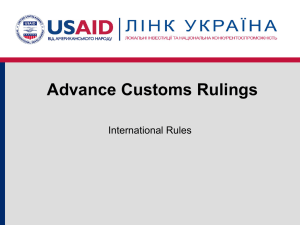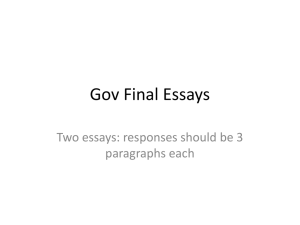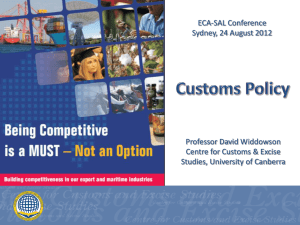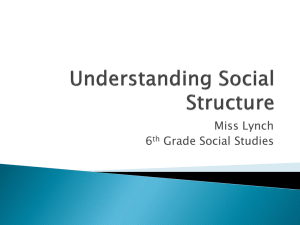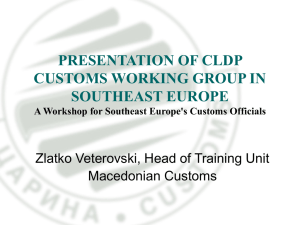Advance rulings UNCTAD Trust Fund for Trade Facilitation Negotiations Background
advertisement
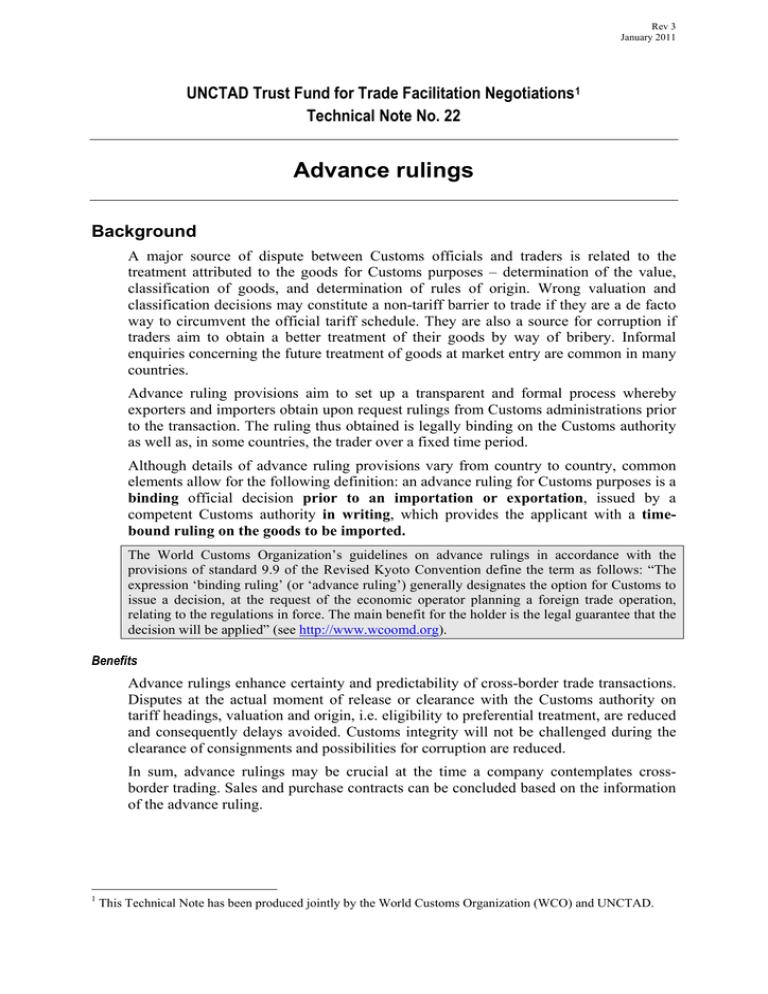
Rev 3 January 2011 UNCTAD Trust Fund for Trade Facilitation Negotiations 1 Technical Note No. 22 Advance rulings Background A major source of dispute between Customs officials and traders is related to the treatment attributed to the goods for Customs purposes – determination of the value, classification of goods, and determination of rules of origin. Wrong valuation and classification decisions may constitute a non-tariff barrier to trade if they are a de facto way to circumvent the official tariff schedule. They are also a source for corruption if traders aim to obtain a better treatment of their goods by way of bribery. Informal enquiries concerning the future treatment of goods at market entry are common in many countries. Advance ruling provisions aim to set up a transparent and formal process whereby exporters and importers obtain upon request rulings from Customs administrations prior to the transaction. The ruling thus obtained is legally binding on the Customs authority as well as, in some countries, the trader over a fixed time period. Although details of advance ruling provisions vary from country to country, common elements allow for the following definition: an advance ruling for Customs purposes is a binding official decision prior to an importation or exportation, issued by a competent Customs authority in writing, which provides the applicant with a timebound ruling on the goods to be imported. The World Customs Organization’s guidelines on advance rulings in accordance with the provisions of standard 9.9 of the Revised Kyoto Convention define the term as follows: “The expression ‘binding ruling’ (or ‘advance ruling’) generally designates the option for Customs to issue a decision, at the request of the economic operator planning a foreign trade operation, relating to the regulations in force. The main benefit for the holder is the legal guarantee that the decision will be applied” (see http://www.wcoomd.org). Benefits Advance rulings enhance certainty and predictability of cross-border trade transactions. Disputes at the actual moment of release or clearance with the Customs authority on tariff headings, valuation and origin, i.e. eligibility to preferential treatment, are reduced and consequently delays avoided. Customs integrity will not be challenged during the clearance of consignments and possibilities for corruption are reduced. In sum, advance rulings may be crucial at the time a company contemplates crossborder trading. Sales and purchase contracts can be concluded based on the information of the advance ruling. 1 This Technical Note has been produced jointly by the World Customs Organization (WCO) and UNCTAD. Subject areas Classification according to the national Customs tariff The identification of the proper tariff heading and subheading determines the duty rate to be applied to goods. A coding system is used for classification purposes and many countries base their national coding system on the HS code (Harmonized Commodity Description and Coding System) developed and administered by WCO. Many tariff codes contain 10,000 headings or more, with highly-technical chapters, such as chemical compounds, textile goods, and electronic components. Sometimes, final classification depends on laboratory analysis of a sample of the goods. Hence, an advance decision on the classification can greatly simplify the clearance process and reduce delays. Valuation of goods The determination of the value for Customs purposes defines the duty liability. It can be a complex and lengthy process and national practices vary. In general, valuation of goods is based on the transaction or invoice value. In case of doubt of the transaction value, Customs authorities can use alternative valuation options – such as using the value of similar or identical goods. This is particularly the case if buyers and sellers are related or associated. For the transparency of the valuation process, it is important to revert to transparent and objective criteria, as laid out, for example, in the WTO Valuation Agreement. Furthermore, it is important to monitor the practice of fraudulent invoicing. An advance ruling on the criteria for Customs valuation is a useful facilitation measure, as traders are aware of the supporting documents they have to present to proof the value of the goods. If the value of goods is questioned by Customs, the burden of proof is with the importer. Rules of origin A rule of origin is a criterion used by Customs to determine the nationality of a product or a producer. Rules of origin are of particular importance when preferential agreements allow for the discrimination of goods depending on sources of supply. However, the determination of origin is complex, as the processing of goods can occur in several countries and might involve products originating in different countries. Advance rulings on origin are already covered by the WTO Agreement on Rules of Origin. Implementation issues National legislation has to provide the legal framework for the validity of advance ruling. The legislation has to clearly state the information to be supplied by the applicant, the period of validity, and reasons for revoking an advance ruling, such as a change in legal provisions or the submission of false information. Furthermore, provisions for civil or administrative appeal procedures have to be applicable to advance rulings as well. Subsequently, there will be a need to establish the procedures required when making and processing a request. Such procedures should include a specification of the time 2 frame involved when making an application, the means of communication, and the time required before the authorities communicate a reply. A specialized unit or section for the treatment of the advance rulings has to be set up in the Customs headquarters and needs to be staffed with sufficiently trained people. A database for the rulings may facilitate the task of the staff and enhance coherence of decisions. Finally, border offices must be fully informed of advance rulings. Options how this communication can be supported by the existing IT infrastructure have to be explored. Processing of advance ruling requests can initially be done as a paper-based transaction and later on transformed into an electronic process. References and tools available World Customs Organization (WCO) Relevant WCO instruments include inter alia the International Convention on the Simplification and Harmonization of Customs Procedures (Revised Kyoto Convention) as well as general information on the Harmonized Commodity Description and Coding System. See http://www.wcoomd.org World Trade Organization (WTO) The WTO Agreement on Implementation of Article VII of the General Agreement on Tariffs and Trade 1994 can be found on http://www.wto.org/english/docs_e/legal_e/20val.pdf. Information on rules of origin and the Uruguay Round Agreement on Rules of Origin are available on http://www.wto.org/English/docs_e/legal_e/22-roo_e.htm The Global Facilitation Partnership for Transportation and Trade (GFP) The Global Facilitation Partnership for Transportation and Trade (GFP) brings together the world’s leading organizations and practitioners in trade and transport facilitation. It creates an open information and exchange platform on major new developments and all aspects of trade and transport facilitation. See http://www.gfptt.org. Further UNCTAD Technical Notes Further Technical Notes and various reports http://www.unctad.org/technicalnotes. See in particular: are available via • Technical Note No. 1 (Publication of trade regulations) The Technical Notes have been produced by technical experts contracted by UNCTAD within the Trust Fund project “Capacity building in developing countries and least developed countries to support their effective participation in the WTO Negotiations Process on trade facilitation”, financed by the Governments of Sweden and Spain. Their purpose is to assist Geneva- and capital-based negotiators to better understand the scope and implications of the various trade facilitation measures being proposed in the context of multilateral negotiations on trade facilitation. The opinions expressed in the Technical Notes may not necessarily coincide with those of the organization or the donors of the Trust Fund. For comments and enquiries please contact trade.logistics@unctad.org. All Technical Notes are available via http://www.unctad.org/technicalnotes. 3
